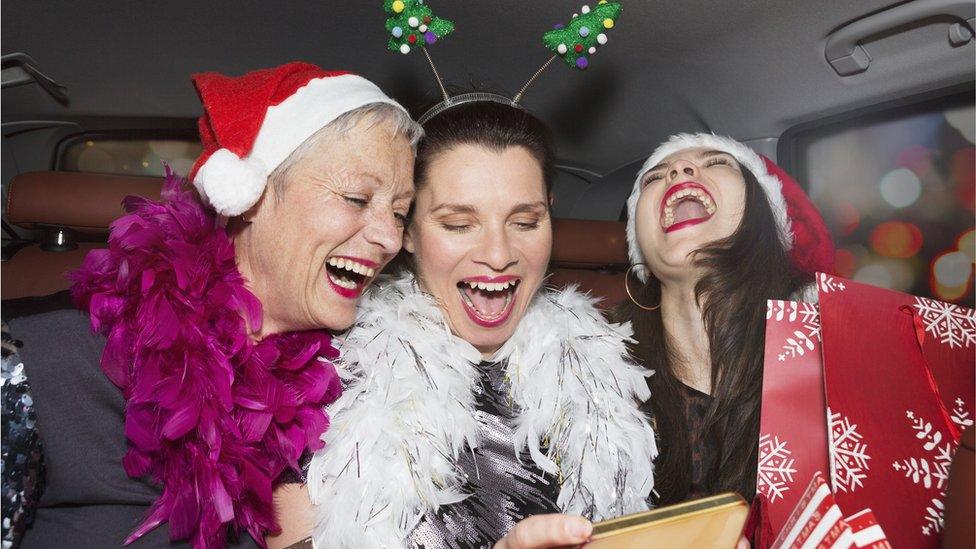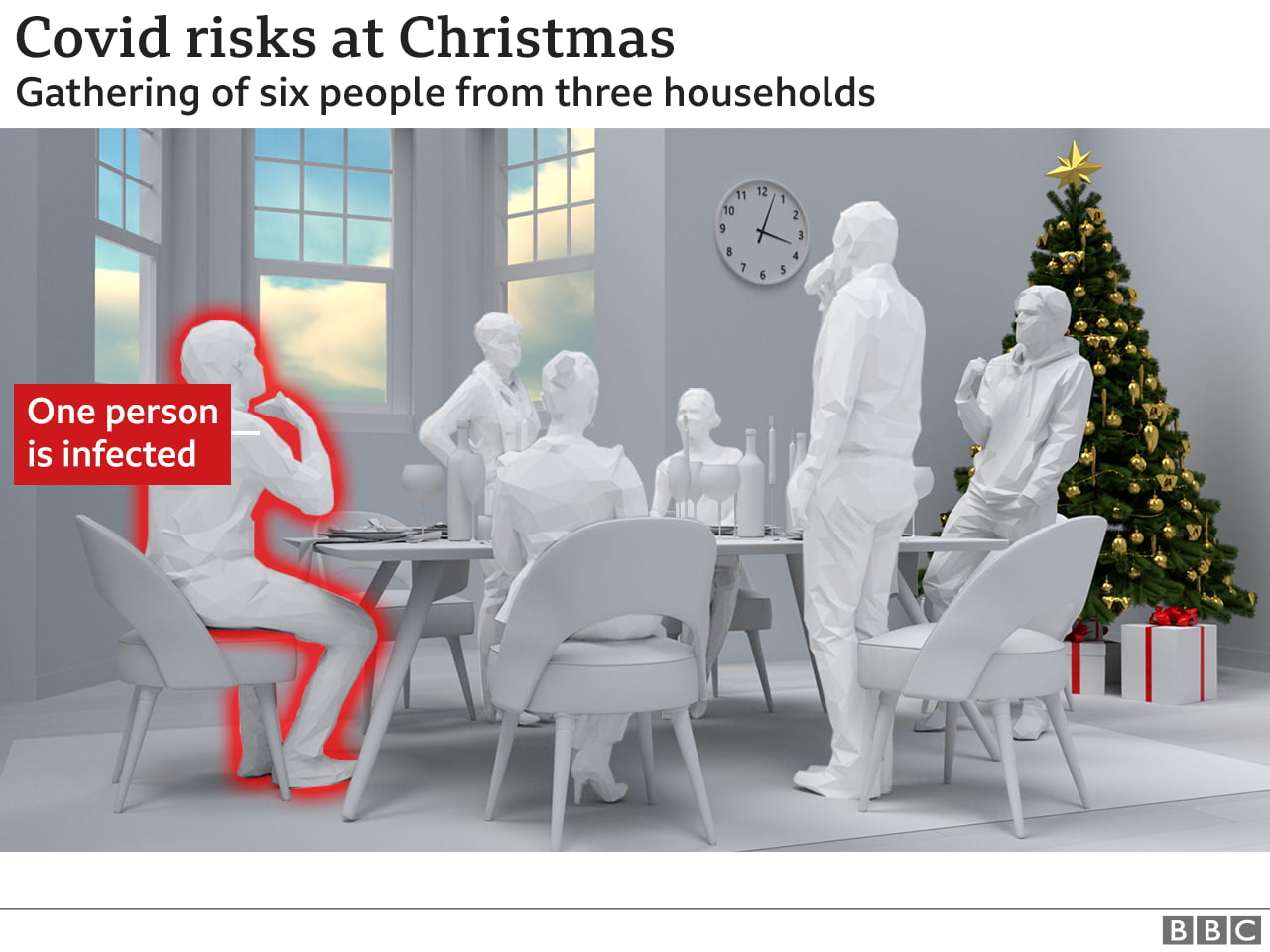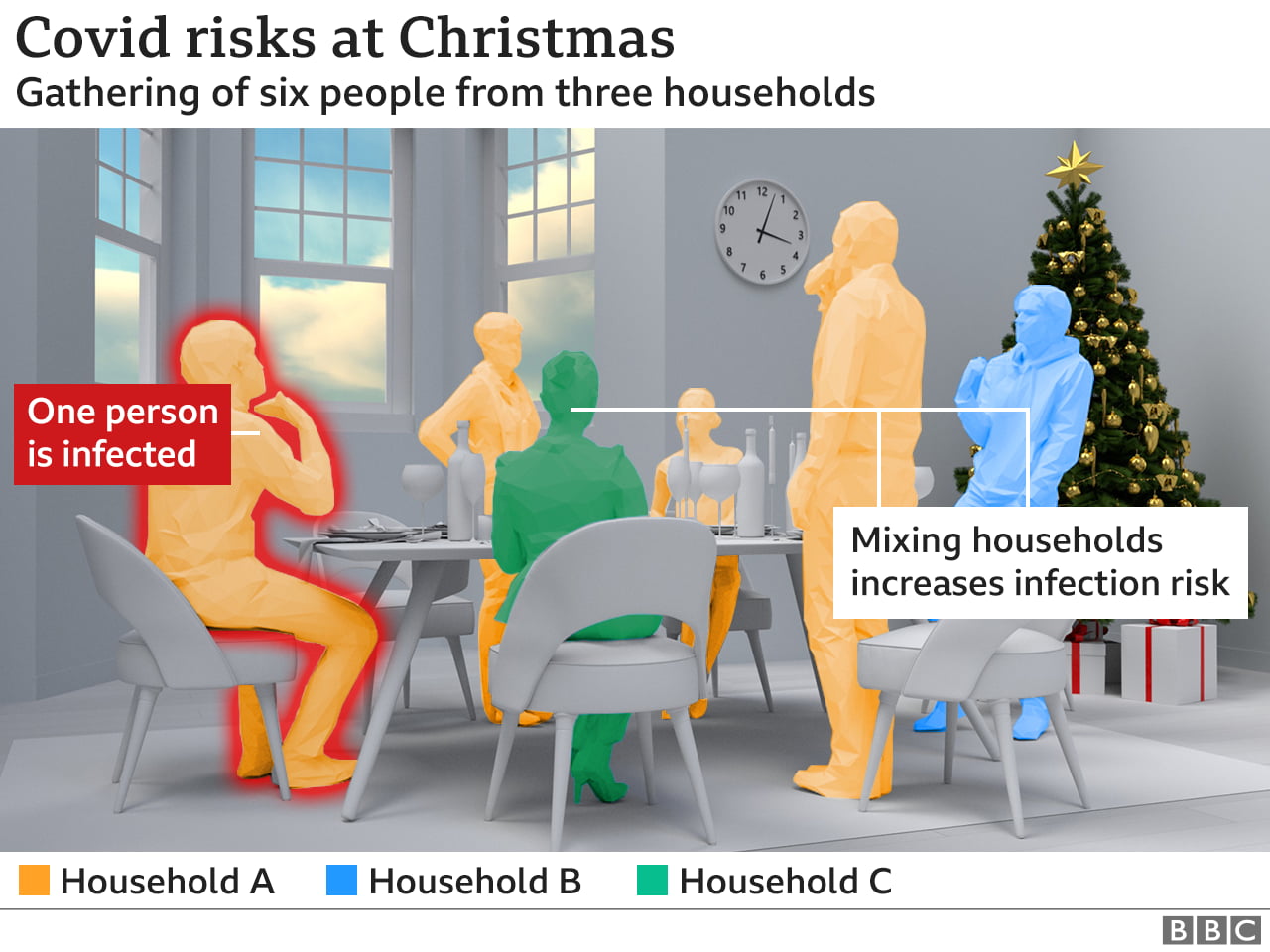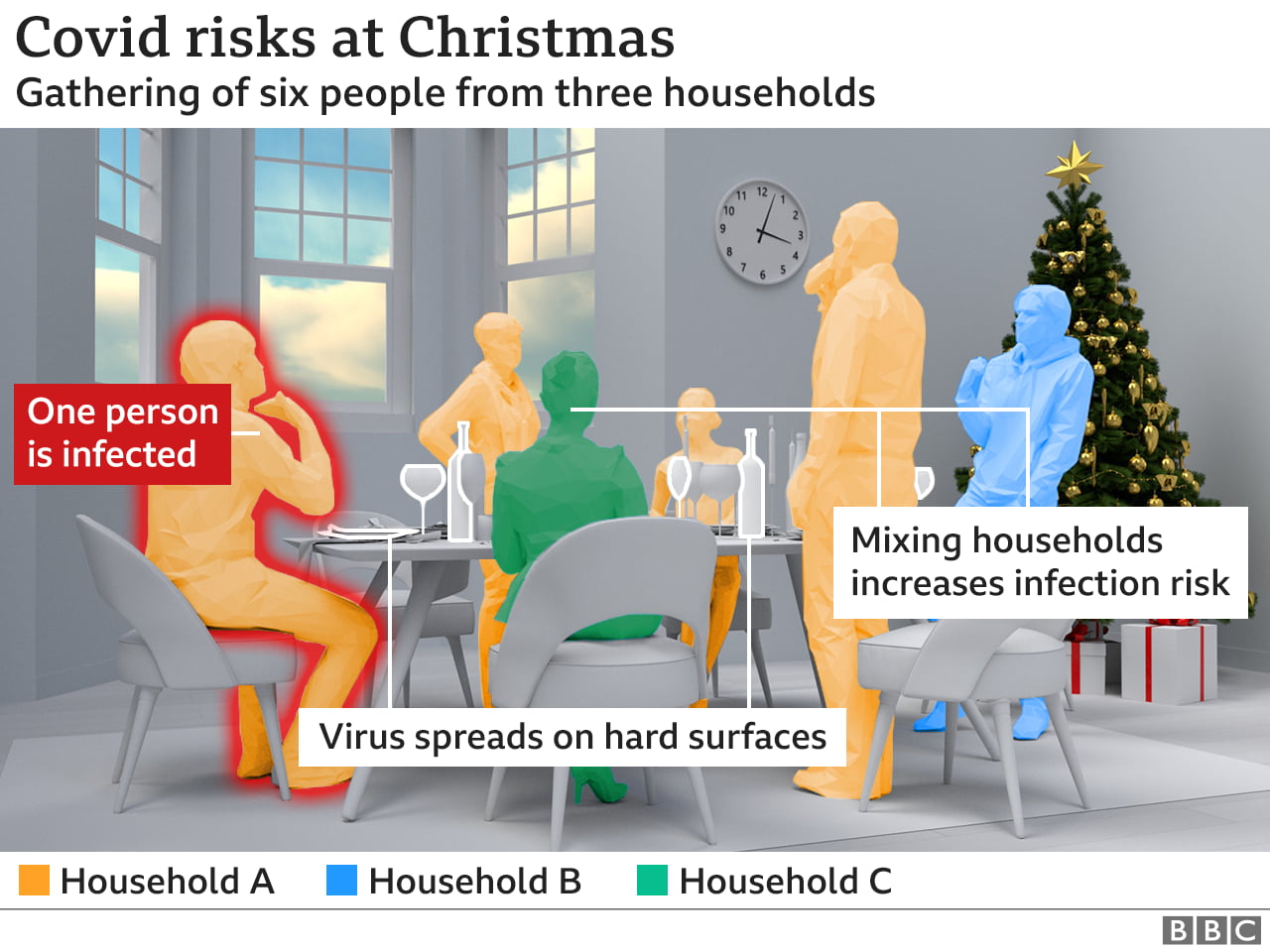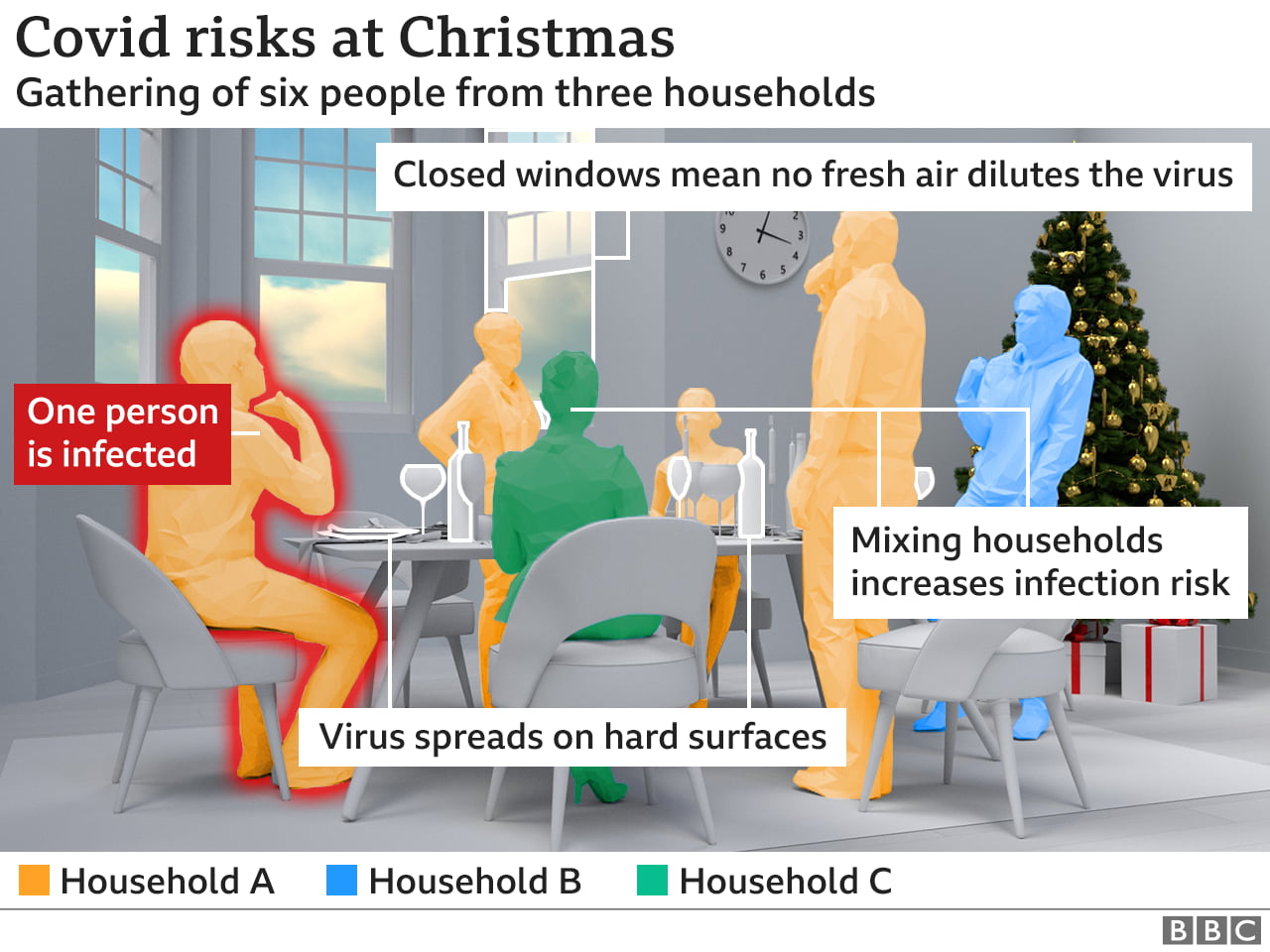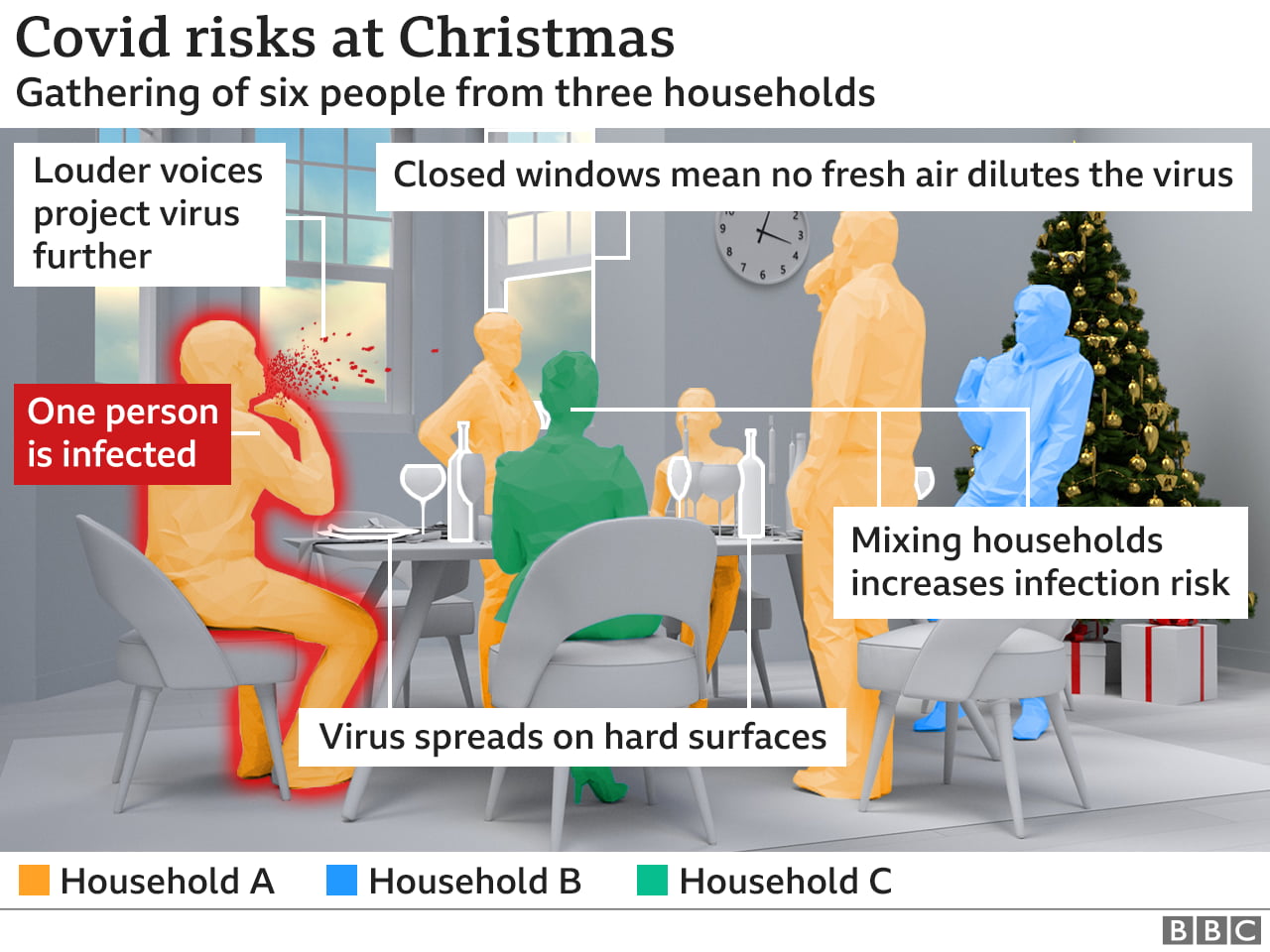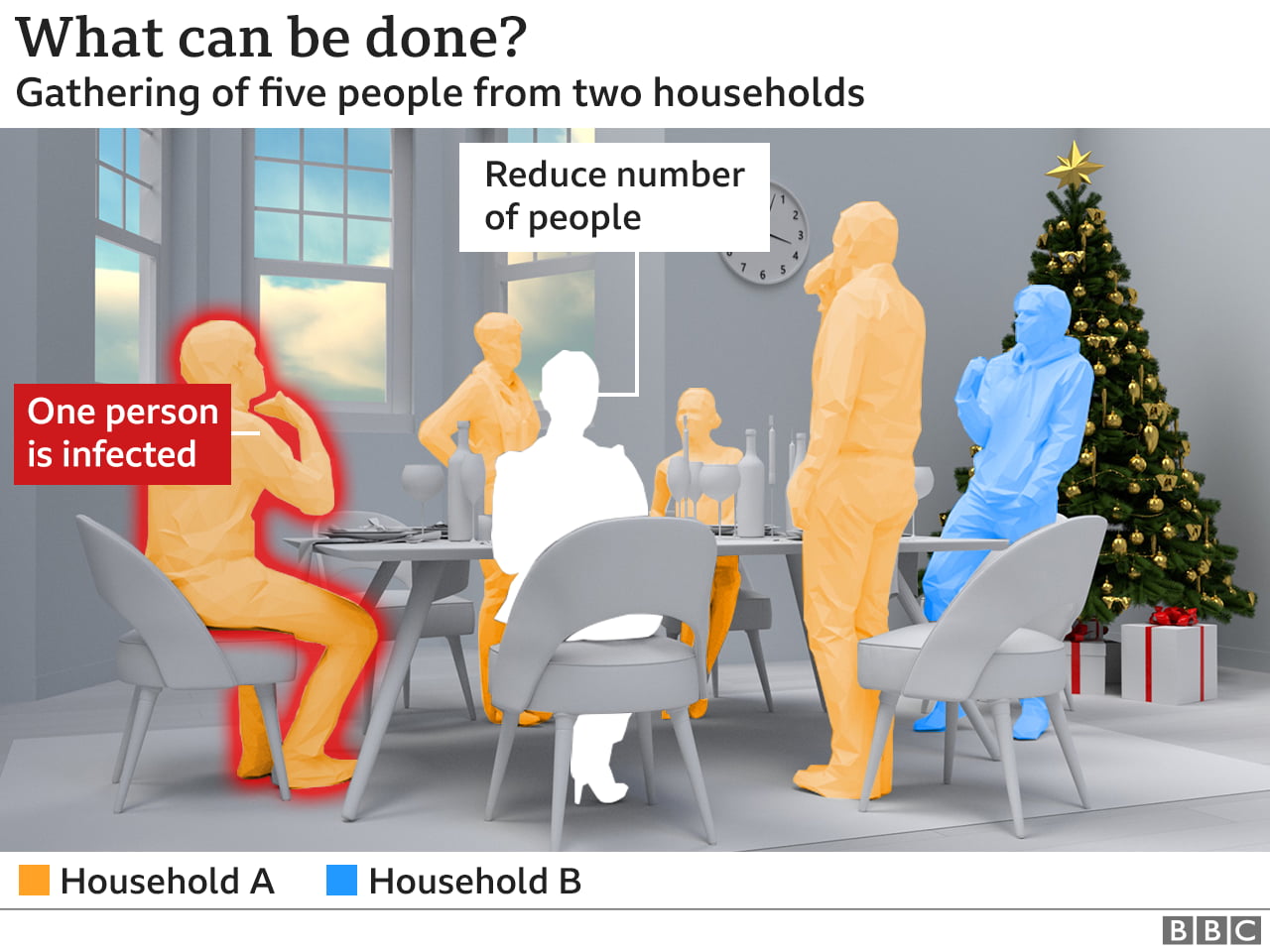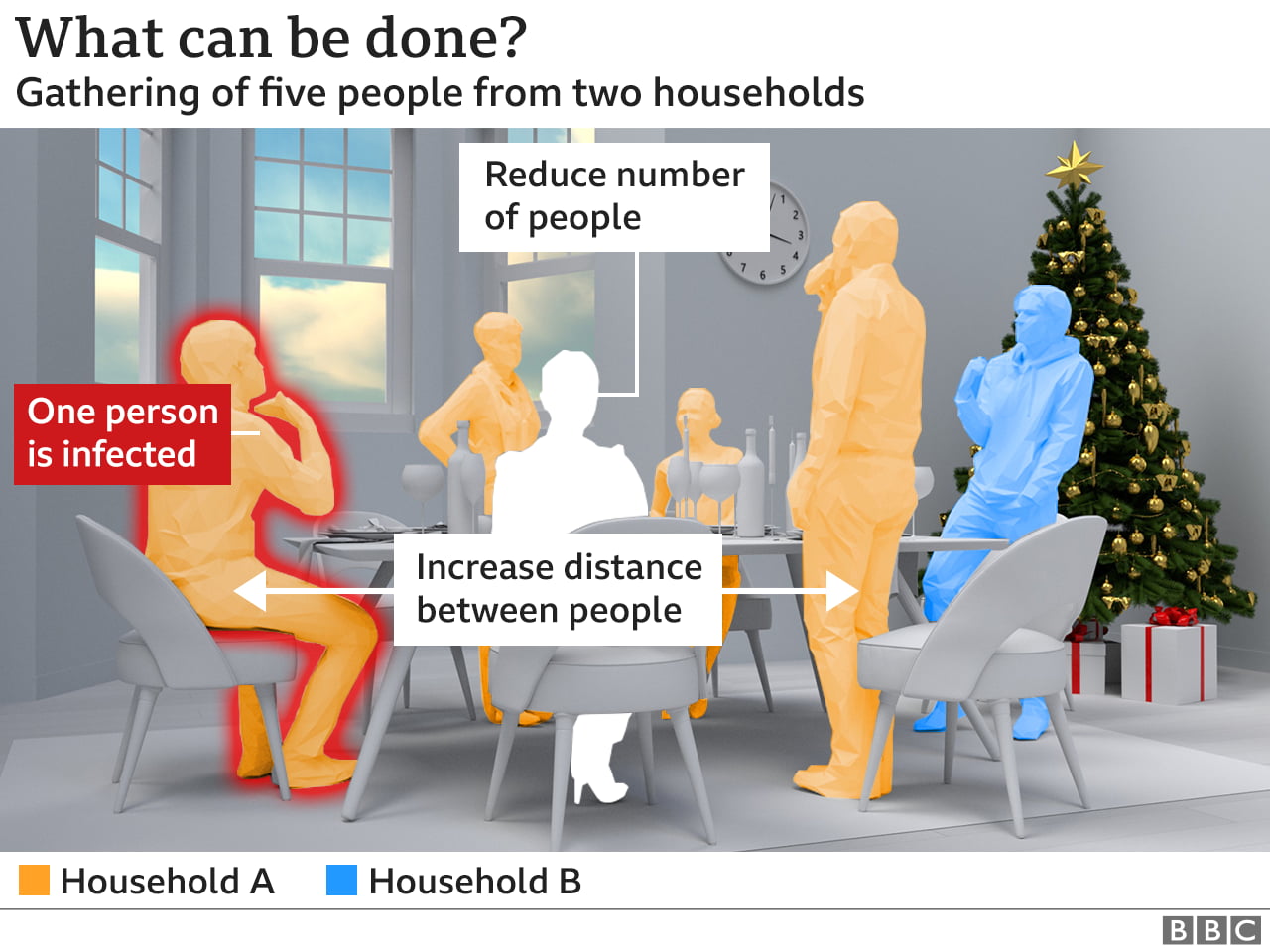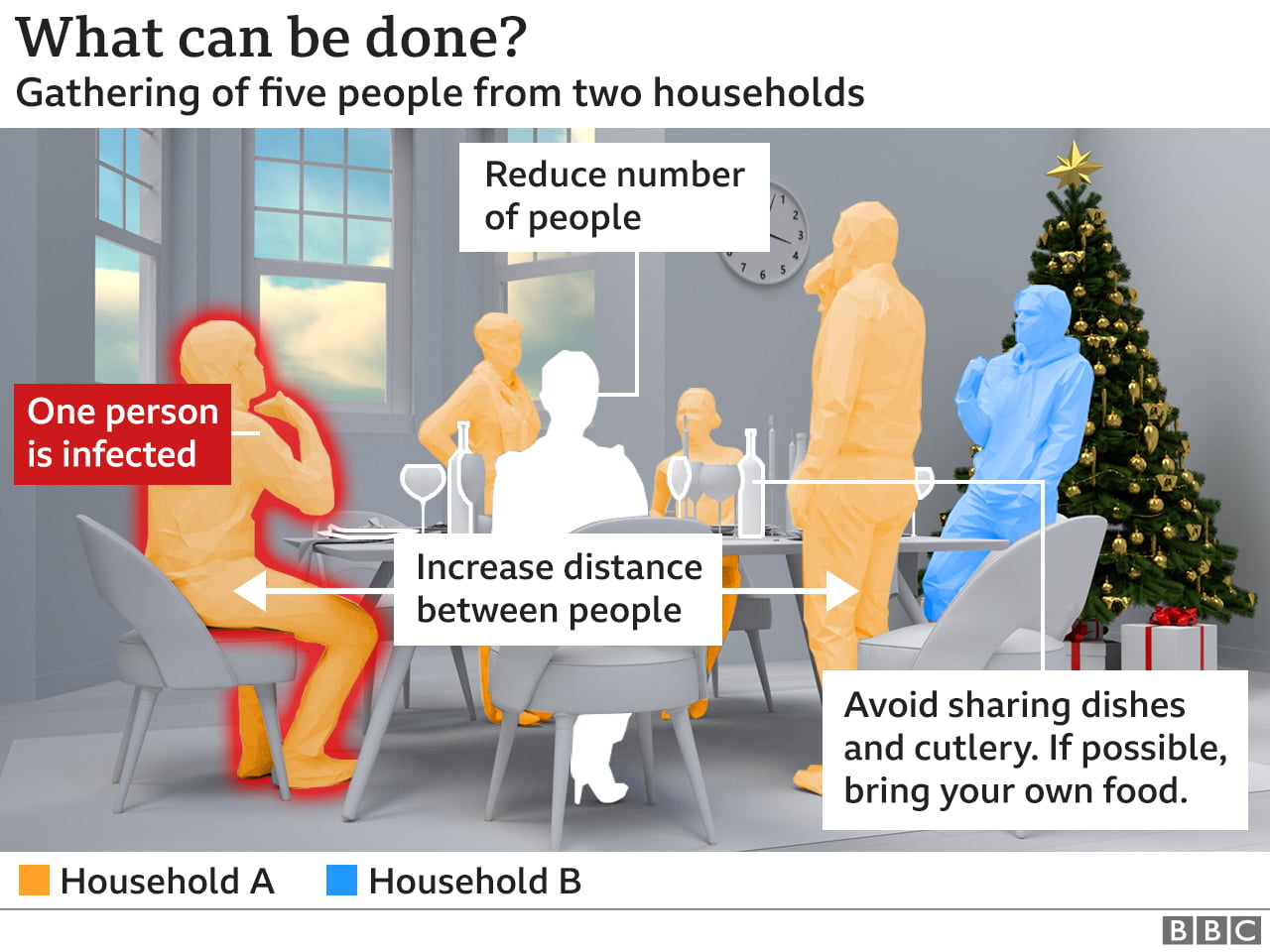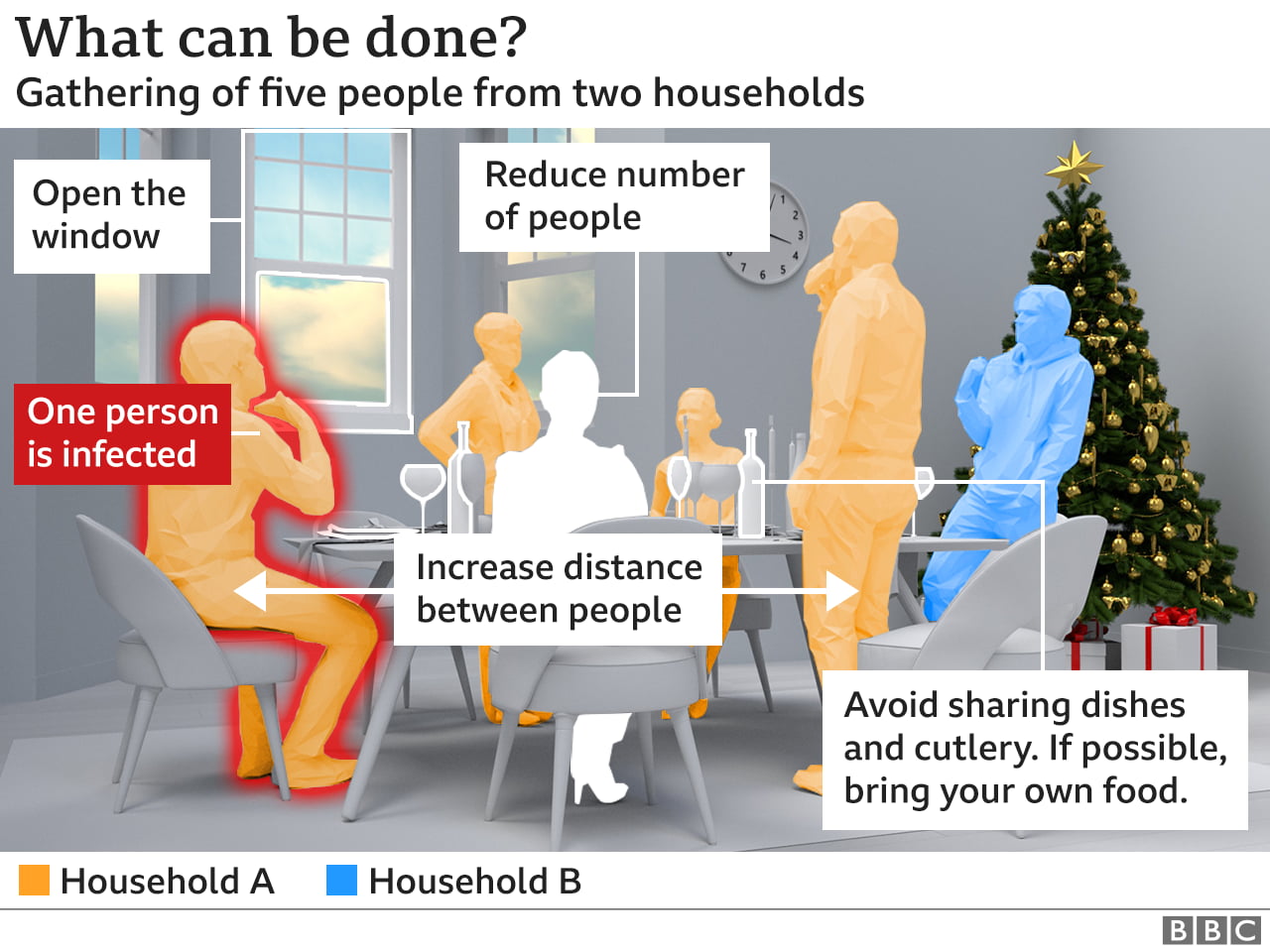Covid: How to keep the virus at bay this Christmas
- Published
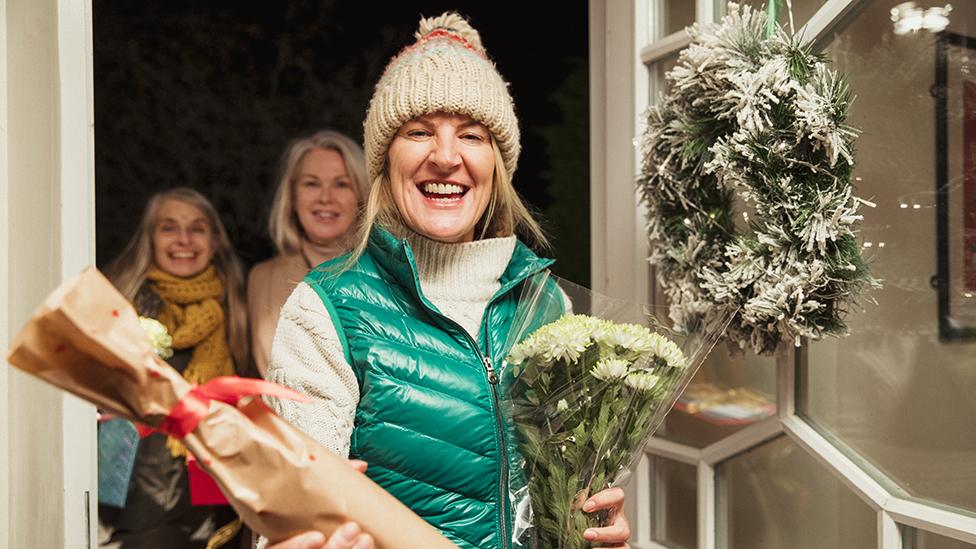
Cosy rooms packed with people chatting, laughing and sharing food and drink are traditional at this time of year.
Unfortunately, they are also ideal for fuelling the pandemic. Now, plans for coronavirus restrictions to be eased for Christmas have been scaled back, or abandoned in areas with the toughest restrictions.
So, for people still planning to meet others - subject to the rules - here are some of the key things to help avoid giving the unwelcome gift of coronavirus.
How many people are invited?
No-one will be popular for saying this, but the evidence is clear - the larger the group, the greater the risk.
If it was summer and we could meet outside, where the virus gets dispersed in fresh air, it would be less of a problem. But it's winter, so everyone's inside.
And the more people who are involved, the greater the likelihood that someone may be a carrier of the virus - maybe without realising, as they have no symptoms.
A study by Sage,, external the government's science advisory panel, concludes that if you double the number of people getting together, the odds of infection increase fourfold.
It also matters how many different households are meeting, as this increases the potential for the virus to spread.
What do the rules say about Christmas gatherings?
The rules have changed.
In tier four areas (that's London and much of the south-east of England), you can't meet people from other households indoors unless they're part of an existing support bubble. And you aren't allowed to travel to other tiers to meet family and friends.
In the other tiers in England, up to three households can meet (subject to social distancing rules), but for Christmas Day only.
In Scotland, up to three households (a maximum of eight people, not including children under 12) can only meet on 25 December. In Wales the limit is two households for Christmas Day only.
In Northern Ireland, up to three households can meet for one day only between 23-27 December.
Are you sharing food and drink?
Passing around dishes and bottles, encouraging everyone to tuck in, is one of the most natural instincts at Christmas.
But coronavirus can survive on surfaces, possibly for several hours, so plates and cutlery can become contaminated.
The same applies to board games where everyone's touching the dice and the cards, so Sage recommends playing quiz-style games instead, external.
It suggests keeping hand sanitiser by the front door and urging everyone arriving to use it.
Above all, don't hug granny. "Elbow bumps or air greetings" are a safer alternative.
Can you keep the noise down?
Amid the excitement of reunions, it's perfectly normal for voices to be raised.
Add a little alcohol, and maybe have a TV or music on as well, and things can get even noisier.
But if someone is infected, the louder they speak, the more virus they release.
A lot of research, external shows that when voices are projected, people emit more tiny droplets of the kind that can carry the coronavirus.
So the advice is to avoid singing and dancing. At the very least, try keep those activities quiet or consider wearing masks.
Maybe the safest option is to hum Silent Night.

How long are you together for?
Popping in for a quick visit is safer than lingering over dinner for several hours.
Researchers say an event's duration has a big impact on the infection risk.
In March, more than 50 members of a US choir were confirmed or suspected of being infected, after a two-and-a-half-hour rehearsal session.
Scientists reckoned, external if it had lasted less than an hour, the number of infections would have been reduced by more than half.
Prof Cath Noakes, one of the study's authors, says the problem is that tiny particles carrying the virus - known as aerosols - can accumulate in the air:
"There is growing evidence that if you're in a poorly-ventilated space for a long period of time with people who are infected, you may breathe in those aerosols and that might be one of the routes of infection," she said.
So the recommendation is to plan for shorter events and to try to maximise quality time together.
Are the windows open?
The obvious answer is: "Of course not, it's too cold outside."
But fresh air dilutes any virus that might be lingering in a crowded room.
A Sage report, external says the infection risk can be four times greater without proper ventilation.
And in this context, "ventilation" doesn't mean having fans blowing the air around, but a flow of air from outside.
Open up for 10-20 minutes every hour, the report says.
So is there a safe way to celebrate?
According to Prof Noakes, people must dream up creative new options for Christmas
That could range from meeting virtually on Zoom, going for a walk, or even delaying big gatherings until next summer.
If you are having a meal indoors, try to minimise contact with others for 7-14 days beforehand.
Work out a plan for how to minimise the risks - and maybe put up signs or labels to remind people.
Also try to avoid having people from different households sitting opposite each other, because speaking face-to-face is another possible route for transmission.
But is any of this feasible?
The smaller the home, the harder these measures will be, the Sage advisers acknowledge.
And laying on hand sanitiser and paying for additional heating while the windows are open may not be affordable for many people.
But any social setting increases the risk of infection, says Prof Noakes, and we will have to compromise and do things in a different way.
"The virus doesn't know it's Christmas," she says. "It's just a virus and it thrives on human contact."

SOCIAL DISTANCING: What are the rules now?
SUPPORT BUBBLES: What are they and who can be in yours?
FACE MASKS: When do I need to wear one?

- Published26 November 2020
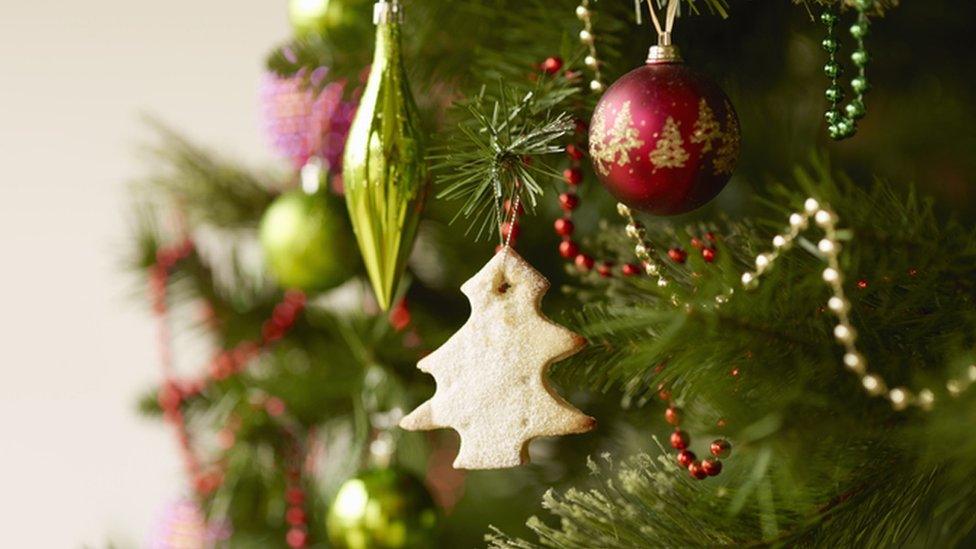
- Published20 November 2020
